2025-10-13 Mon
■ #6013. 2025年度の朝カルシリーズ講座の第6回「English --- 慣れ親しんだ単語をどこまでも深掘りする」をマインドマップ化してみました [asacul][mindmap][notice][kdee][hee][etymology][hel_education][link][sound_change][spelling_pronunciation_gap][anglo-saxon][jute][history][germanic][oe][world_englishes][demonym][suffix][onomastics]
9月27日(土)に,今年度の朝日カルチャーセンターのシリーズ講座「歴史上もっとも不思議な英単語」の第6回(夏期クールとしては第3回)が新宿教室にて開講されました.テーマは「English --- 慣れ親しんだ単語をどこまでも深掘りする」です.あまりに馴染み深い単語ですが,これだけで90分語ることができるほど豊かなトピックです.
講座と関連して,事前に Voicy heldio にて「#1574. "English" という英単語について思いをめぐらせたことはありますか? --- 9月27日の朝カル講座」を配信しました.
この第6回講座の内容を markmap によりマインドマップ化して整理しました(画像をクリックして拡大).復習用にご参照いただければ.
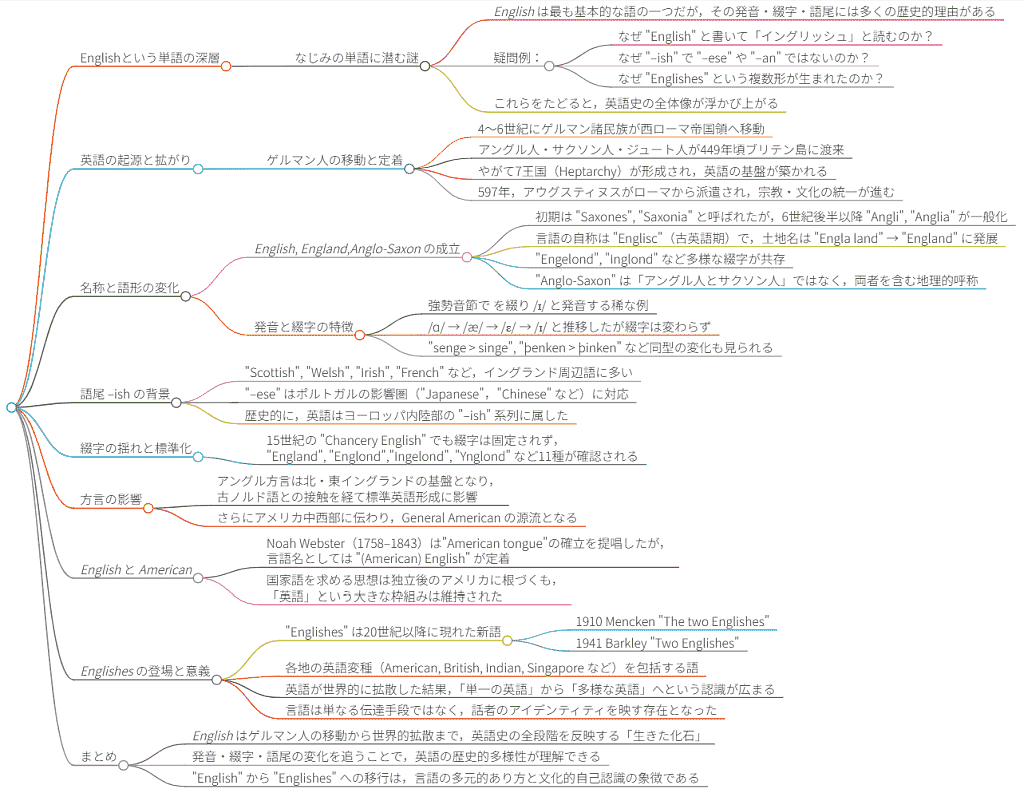
なお,この朝カル講座のシリーズの第1回から第4回についてもマインドマップを作成しています.
・ 「#5857. 2025年度の朝カルシリーズ講座の第1回「she --- 語源論争の絶えない代名詞」をマインドマップ化してみました」 ([2025-05-10-1])
・ 「#5887. 2025年度の朝カルシリーズ講座の第2回「through --- あまりに多様な綴字をもつ語」をマインドマップ化してみました」 ([2025-06-09-1])
・ 「#5915. 2025年度の朝カルシリーズ講座の第3回「autumn --- 類義語に揉み続けられてきた季節語」をマインドマップ化してみました」 ([2025-07-07-1])
・ 「#5949. 2025年度の朝カルシリーズ講座の第4回「but --- きわめつきの多義の接続詞」をマインドマップ化してみました」 ([2025-08-10-1])
・ 「#5977. 2025年度の朝カルシリーズ講座の第5回「guy --- 人名からカラフルな意味変化を遂げた語」をマインドマップ化してみました」 ([2025-09-07-1])
シリーズの次回,第7回は,10月25日(土)「I --- 1人称単数代名詞をめぐる物語」と題して開講されます.秋期クールの開始となるこの回より,開講時間は 15:30--17:00,開講方式はオンラインのみへ変更となります.ご関心のある方は,ぜひ朝日カルチャーセンター新宿教室の公式HPより詳細をご確認の上,お申し込みいただければ幸いです.
2025-09-01 Mon
■ #5971. 602年,Kent でローマ字が採用される [alphabet][christianity][oe][anglo-saxon][st_augustine][history][writing][runic][kentish][oe_dialect][jute][100_places]
597年,Kent にキリスト教がもたらされた経緯については「#5444. 古英語の原文を読む --- 597年,イングランドでキリスト教の布教が始まる」 ([2024-03-23-1]) 等の記事で取り上げてきた.イングランド史上,そして英語史上,きわめて重大な出来事だったといってよい.
様々なインパクトがあったが,そのうちの1つはキリスト教とともにローマ字 (Roman alphabet) が導入されたことだ.古来,ゲルマン民族はローマ字と親戚関係にあったルーン文字 (runic script) をもっていたが,これを機に使用文字をローマ字へと乗り換えていくことになった.
そのローマ字の受容の象徴的な年として,602年を挙げることができる.Lucas and Mulvey (19) の "CANTERBURY --- The adoption of the Roman alphabet (602)" と題する節から,冒頭の3段落を引用する.
The Jutish kingdom of Kent is the first region of post-Roman Britannia to leave evidence of an organized realm. That is because Kent was the first area to be reconverted to Christianity. Sent by Pope Gregory, Augustine and fellow monks arrived in Canterbury in 597, bringing not only Christianity but also writing in the form of Roman script. In 602, King Ethelbert of Kent had the monks write down the laws of his people in that script.
Those laws, called 'dooms', had been brought to Kent from Continental Europe 150 years before. They are the first surviving example, in any Germanic language, of a legal document. They are the starting point of the Anglo-American common law and tradition. They are also of great importance in the history of the English language.
First, they show that within five years of the arrival of the Roman script, it had been adopted in place of the runic alphabet . . . . Second, they provide evidence of Kentish, a dialect of English that was to disappear altogether. Third, they are the beginning of regular and widespread written records in English, as the script of the dooms spread rapidly west and north.
ケント王 Ethelbert が602年に法律をローマ字で書き記させたというのが,その後の英語のローマ字使用の伝統にとって決定的な出来事だったことになる.英米法の歴史の観点からも非常に重要な年だったことが分かる.
それにしてもローマ字の広がり方が早いし速い.597年のたかだか5年後のことである.ローマ字は間違いなくキリスト教とともにもたらされたものなのだ.
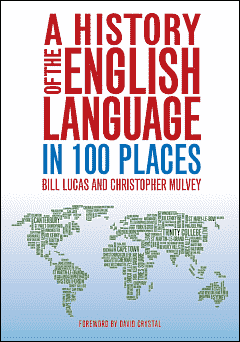
・ Lucas, Bill and Christopher Mulvey. A History of the English Language in 100 Places. London: Robert Hale, 2013.
2023-12-10 Sun
■ #5340. 「ゲルマン征服」をめぐって Taku さんと対談精読実況生中継しました --- heldio の「英語史の古典的名著 Baugh and Cable を読む」シリーズ [voicy][heldio][hel_education][link][notice][bchel][anglo-saxon][oe][jute][history][germanic]
一昨日12月8日(金)の夜に,帝京科学大学の金田拓さんとともに,Baugh and Cable の英語史書の「対談精読実況生中継」を Voicy heldio/helwa で配信しました.前半と後半を合わせて2時間弱の濃密なおしゃべり読書会となりました.ライヴでお聴きいただいた多くのリスナーの方々に感謝いたします.ありがとうございました.
精読対象となったのはの同書の第32節 The Germanic Conquest (ゲルマン征服)です.伝統的に英語史の開始とされる449年とその前後の出来事にフォーカスしました.対談相手を務めていただいた Taku さんとともに,著者の英文に唸りつつ,内容についてもなるべく深く掘り下げて議論しました.当該の英文テキストは,先日の予告記事「#5335. 「ゲルマン征服」 --- Baugh and Cable の英語史より」([2023-12-05-1])に掲載しています.
(1) 「#922. 英語史の古典的名著 Baugh and Cable を読む (32) The Germanic Conquest --- Taku さんとの実況中継(前半)」
(2) 「【英語史の輪 #65】英語史の古典的名著 Baugh and Cable を読む (32) The Germanic Conquest --- Taku さんとの実況中継(後半)」(12月分のプレミアムリスナー限定配信チャンネル「英語史の輪」 (helwa) に含まれる有料配信です)
今回の対談精読実況生中継をお聴きになって,このオンライン精読シリーズに関心を持った方は,ぜひ本書を入手し,シリーズ初回からゆっくりと追いかけていただければと思います.間違いなく良書です.配信のバックナンバーは「#5291. heldio の「英語史の古典的名著 Baugh and Cable を読む」シリーズが順調に進んでいます」 ([2023-10-22-1]) よりご確認ください.今後も週1,2回のペースでシリーズを継続していきます!
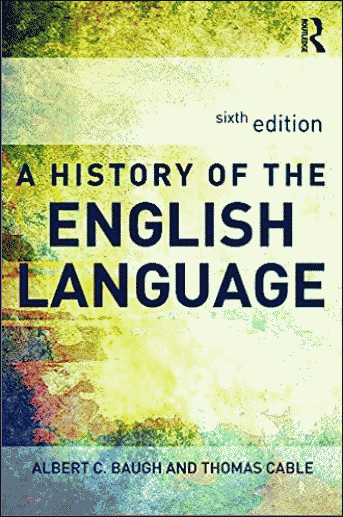
・ Baugh, Albert C. and Thomas Cable. A History of the English Language. 6th ed. London: Routledge, 2013.
2022-07-30 Sat
■ #4842. 英語は歴史の始まりからすでに混種言語だった? [variety][dialect][germanic][oe][jute][history][oe_dialect][anglo-saxon][dialect_contact][dialect_mixture]
1860年代に出版された Marsh による英語史講義録をパラパラめくっている.Marsh によれば,アングロサクソン語,すなわち古英語は,大陸からブリテン島に持ち込まれた諸方言の混合体であり,その意味においてブリテン島に "aboriginal" な言語とは言えないものの "indigenous" な言語ではあると述べている.言語としては混合体ならではの "diversity" を示し,"obscure", "confused", "imperfect", "anomalous", "irregular" であるという.以下,関連する箇所を引用する.
§15. It has been already shown that the Anglo-Saxon conquerors consisted of several tribes. The border land of the Scandinavian and Teutonic races, whence the Anglo-Saxon invaders emigrated, has always been remarkable for the number of its local dialects. The Friesian, which bears a closer resemblance than any other linguistic group to the English, differs so much in different localities, that the dialects of Friesian parishes, separated only by a narrow arm of the sea, are often quite unintelligible to the inhabitants of each other. Moreover, the Anglo-Saxon language itself supplies internal evidence that there was a great commingling of nations in the invaders of our island. This language, in its obscure etymology, its confused and imperfect inflexions, and its anomalous and irregular syntax, appears to me to furnish abundant proof of a diversity, not of a unity, of origin. It has not what is considered the distinctive character of a modern, so much as of a mixed and ill-assimilated speech, and its relations to the various ingredients of which it is composed are just those of the present English to its own heterogeneous sources. It borrowed roots, and dropped endings, appropriated syntactical combinations without the inflexions which made them logical, and had not yet acquired a consistent and harmonious structure when the Norman conquest arrested its development, and imposed upon it, or, perhaps we should say, gave a new stimulus to, the tendencies which have resulted in the formation of modern English. There is no proof that Anglo-Saxon was ever spoken anywhere but on the soil of Great Britain; for the 'Heliand,' and other remains of old Saxon, are not Anglo-Saxon, and I think it must be regarded, not as a language which the colonists, or any of them, brought with them from the Continent, but as a new speech resulting from the fusion of many separate elements. It is, therefore, indigenous, if not aboriginal, and as exclusively local and national in its character as English itself.
古英語の生成に関する Marsh のこの洞察は優れていると思う.しかし,評価するにあたり,この講義録がイギリス帝国の絶頂期に出版されたという時代背景は念頭に置いておくべきだろう.引用の最後にある "exclusively local and national in its character as English itself" も,その文脈で解釈する必要があるように思われる.
古英語の生成については「#389. Angles, Saxons, and Jutes の故地と移住先」 ([2010-05-21-1]),「#2868. いかにして古英語諸方言が生まれたか」 ([2017-03-04-1]),「#4439. 古英語は混合方言として始まった?」 ([2021-06-22-1]) の記事も参照.
・ Marsh, George Perkins. Lectures on the English Language: Edited with Additional Lectures and Notes. Ed. William Smith. 4th ed. London: John Murray, 1866. Rpt. HardPress, 2012.
2018-05-27 Sun
■ #3317. The Anglo-Saxon Chronicle にみる Hengest と Horsa [anglo-saxon][oe][literature][popular_passage][oe_text][jute][history]
449年,Hengest と Horsa というジュート人の兄弟がブリトン人を助けるためにイングランドに渡り,その後むしろイングランドを征服してしまうという事件が起こった.このくだりは,The Anglo-Saxon Chronicle に詳しいが,以下では古英語初学者向けに改編された Smith (158--59) より,関連する古英語[2018-05-31-1]原文箇所を引用する.年代記の449年,455年,457年の記述より抜粋したものである.現代英語訳も付いているので,古英語読解の学習にもどうぞ.(別の関連する記述は「#389. Angles, Saxons, and Jutes の故地と移住先」 ([2010-05-21-1]) および「#2900. 449年,アングロサクソン人によるブリテン島侵略」 ([2017-04-05-1]) を参照.)
Anno 449. Hēr Martiānus and Valentīnus onfēngon rice, and rīcsodon seofon winter. And on hiera dagum Hengest and Horsa, fram Wyrtgeorne gelaþode, Bretta cyninge, gesōton Bretene on þǣm stede þe is genemned Ypwinesflēot, ǣrest Brettum tō fultume, ac hīe eft on hīe fuhton. Se cyning hēt hīe feohtan ongēan Peohtas; and hīe swā dydon, and sīge hæfdon swā hwǣr swā hīe cōmon. Hīe þā sendon tō Angle, and hēton him sendan māran fultum. Þā sendon hīe him māran fultum. Þā cōmon þā menn of þrim mǣgþum Germānie: of Ealdseaxum, of Englum, of Iotum.
455. Hēr Hengest and Horsa fuhton wiþ Wyrtgeorne þǣm cyninge in þǣre stōwe þe is genemned Æglesþrep; and his brōþor Horsan man ofslōg. And æfter þǣm Hengest fēng tō rīce, and Æsc his sunu.
457. Hēr Hengest and Æsc fuhton wiþ Brettas in þǣre stōwe þe is genemned Crecganford, and þǣr ofslōgon fēower þūsend wera. Þā forlēton þā Brettas Centland, and mid micle ege flugon tō Lundenbyrig.
Anno 449. In this year [lit. here] Martianus and Valentinus succeeded to [lit. received] kingship, and ruled seven years. And in their days Hengest and Horsa, invited by Vortigern, king of [the] Britons, came to Britain at the place which is called Ebbsfeet, first as a help to [the] Britons, but they afterwards fought against them. The king commanded them to fight against [the] Picts; and they did so, and had victory wherever they came. Then they sent to Angeln, and told them to send more help. They then sent to them more help. Then the men came from three tribes in Germany: from [the] Old Saxons, from [the] Angles, from [the] Jutes.
455. In this year Hengest and Horsa fought against Vortigern the king in the place which is called Aylesford; and his brother Horsa was slain [lit. one slew his brother Horsa]. And after that Hengest and Æsc his son succeeded to kingship [lit. Hengest succeeded to kingship, and Æsc his son].
457. In this year Hengest and Æsc fought against [the] Britons in the place which is called Crayford, and there slew four thousand men [lit. of men]. The Britons then abandoned Kent, and with great fear fled to London.
Hengest と Horsa のブリテン島侵攻については,anglo-saxon の記事のほか,とりわけ以下を参照.
・ 「#33. ジュート人の名誉のために」 ([2009-05-31-1])
・ 「#389. Angles, Saxons, and Jutes の故地と移住先」 ([2010-05-21-1])
・ 「#1013. アングロサクソン人はどこからブリテン島へ渡ったか」 ([2012-02-04-1])
・ 「#2353. なぜアングロサクソン人はイングランドをかくも素早く征服し得たのか」 ([2015-10-06-1])
・ 「#2443. イングランドにおけるケルト語地名の分布」 ([2016-01-04-1])
・ 「#2493. アングル人は押し入って,サクソン人は引き寄せられた?」 ([2016-02-23-1])
・ 「#2900. 449年,アングロサクソン人によるブリテン島侵略」 ([2017-04-05-1])
・ 「#3094. 449年以前にもゲルマン人はイングランドに存在した」 ([2017-10-16-1])
・ 「#3113. アングロサクソン人は本当にイングランドを素早く征服したのか?」 ([2017-11-04-1]) を参照.
・ Smith, Jeremy J. Essentials of Early English. 2nd ed. London: Routledge, 2005.
2010-05-21 Fri
■ #389. Angles, Saxons, and Jutes の故地と移住先 [jute][history][germanic][popular_passage][dialect][kyng_alisaunder][map][anglo-saxon]
英語の歴史は,449年に北ドイツや南デンマークに分布していたアングル人 ( Angles ),サクソン人 ( Saxons ),ジュート人 ( Jutes ) の三民族が西ゲルマン語派の方言を携えてブリテン島に渡ってきたときに始まる ( see [2009-06-04-1] ).ケルトの王 Vortigern が,北方民族を撃退してくれることを期待して大陸の勇猛なゲルマン人を招き寄せたということが背景にある.その年を限定的に449年と言えるのは,古英語期の学者 Bede による The Ecclesiastical History of the English People という歴史書にその記述があるからである.この記述は後に The Anglo-Saxon Chronicle にも受け継がれ,ブリテン島における英語を含めた Anglo-Saxon の伝統の創始にまつわる神話として,現在に至るまで広く言及されてきた.The Anglo-Saxon Chronicle の北部系校訂本の代表である The Peterborough Chronicle の449年の記述から,有名な一節を古英語で引用しよう.現代英語訳とともに,Irvine (35) より抜き出したものである.
Ða comon þa men of þrim megðum Germanie: of Aldseaxum, of Anglum, of Iotum. Of Iotum comon Cantwara 7 Wihtwara, þet is seo megð þe nu eardaþ on Wiht, 7 þet cyn on Westsexum þe man nu git hæt Iutnacynn. Of Ealdseaxum coman Eastseaxa 7 Suðsexa 7 Westsexa. Of Angle comon, se a syððan stod westig betwix Iutum 7 Seaxum, Eastangla, Middelangla, Mearca and ealla Norþhymbra.
PDE translation: Those people came from three nations of Germany: from the Old Saxons, from the Angles, and from the Jutes. From the Jutes came the inhabitants of Kent and the Wihtwara, that is, the race which now dwells in the Isle of Wight, and that race in Wessex which is still called the race of the Jutes. From the Old Saxons came the East Saxons, the South Saxons, and the West Saxons. From the land of the Angles, which has lain waste between the Jutes and the Saxons ever since, came the East Anglians, the Middle Anglians, the Mercians, and all of the Northumbrians.
この一節に基づいて形成されてきた移住神話 ( migration myth ) は,いくつかの事実を覆い隠しているので注意が必要である.449年は移住の象徴の年として理解すべきで,実際にはそれ以前からゲルマン民族が大陸よりブリテン島に移住を開始していた形跡がある.また,449年に一度に移住が起こったわけではなく,5世紀から6世紀にかけて段階的に移住と定住が繰り返されたということもある.他には,アングル人,サクソン人,ジュート人の三民族の他にフランク人 ( Franks ) もこの移住に加わっていたとされる.同様に,現在では疑問視されてはいるが,フリジア人 ( Frisians ) の混在も議論されてきた.移住の詳細については,いまだ不明なことも多いようである ( Hoad 27 ).
上の一節にもあるとおり,主要三民族は大陸のそれぞれの故地からブリテン島のおよそ特定の地へと移住した.大雑把に言えば,ジュート人は Kent や the Isle of Wight,サクソン人はイングランド南部へ,アングル人はイングランド北部や東部へ移住・定住した(下の略地図参照).古英語の方言は英語がブリテン島に入ってから分化したのではなく,大陸時代にすでに分化していた三民族の方言に由来すると考えられる.
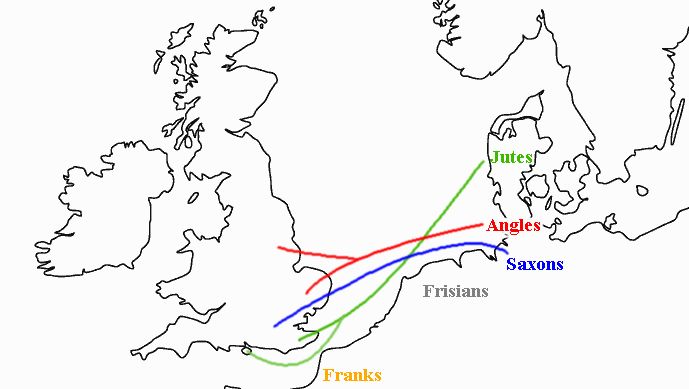
西ゲルマン諸民族のなかで,特に Jutes の果たした役割については[2009-05-31-1]を参照.また,上の一節については,オンラインからも古英語と現代英語訳で参照できる.
・ Irvin, Susan. "Beginnings and Transitions: Old English." The Oxford History of English. Ed. Lynda Mugglestone. Oxford: OUP, 2006. 32--60.
・ Hoad, Terry. "Preliminaries: Before English." The Oxford History of English. Ed. Lynda Mugglestone. Oxford: OUP, 2006. 7--31.
2009-05-31 Sun
■ #33. ジュート人の名誉のために [jute][map][anglo-saxon][history]
5世紀,ブリトン人(ケルトの一派)が北方のピクト人・スコット人に対抗するために,大陸のゲルマン人に援助を求めた.そこで,アングル人 (Angles),サクソン人 (Saxons),ジュート人 (Jutes) が後に英語と呼ばれる言語を携えてブリテン島へやってきた.彼らは招待主であるブリトン人を排除し,自らの王国をブリテン島に樹立した.以上が,英語の始まりを告げる出来事である.
アングル人とサクソン人は "Anglo-Saxon" という語を通じ広く知られている.特にアングル人などは "England" や "English" という語そのものに貢献している.それに比べて,ジュート人は非常に影が薄い.彼らは,現在のデンマークのユトランドからやってきたとされる.ユトランドは,英語では "Jutland" 「ジュート人の地」と表記する(地図参照).
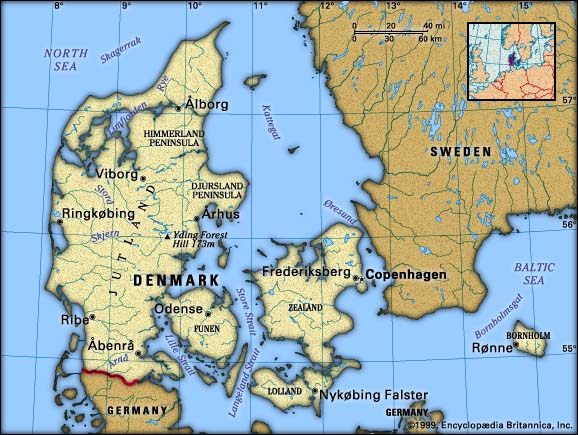
ジュート人は,ブリテン島では Kent,the Isle of Wight, そして一部 Hampshire に住み着いたようだ.
さて,比較的かげの薄いジュート人の名誉のために,彼らの果たした歴史的役割を紹介しておこう.古英語期に活躍した歴史家・神学者の Bede によれば,ブリトン人の王 Vortigern が援助を求めて大陸から呼び寄せたゲルマン人を統括していたのは Hengist と Horsa という名の兄弟であった.彼らの子孫が後にケント王国を治める王となったことから,この家系はジュート人だった可能性が高い.つまり,ブリテン島に英語が根付く最初の契機に関わったのは,ジュート人の首領だったというわけである.彼らがブリテン島への定住の先鞭をつけ,その後で,大陸に残っていたアングル人やサクソン人を含む親戚を,追加的にブリテン島へ呼び寄せたのである.
ジュート人の英語史上の意義,つまりブリテン島で英語を開始したという功績,は念頭に置いておきたい.
Powered by WinChalow1.0rc4 based on chalow